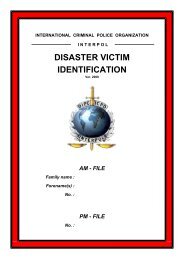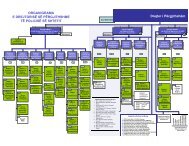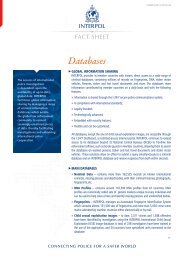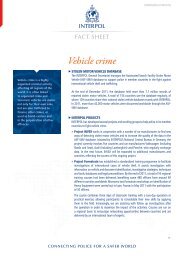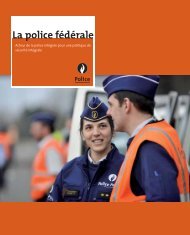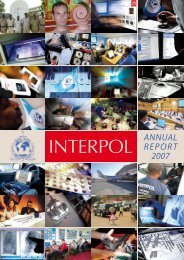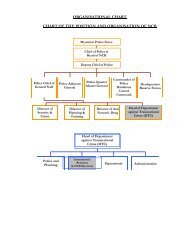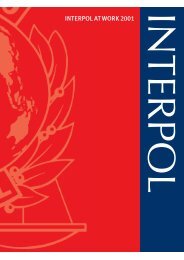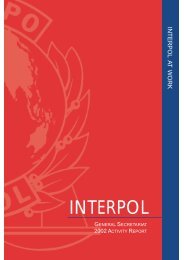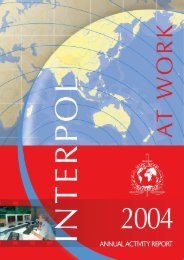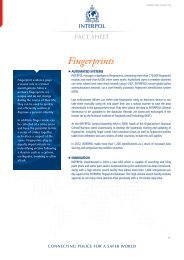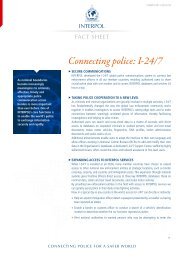- Page 1 and 2:
16th International Forensic Science
- Page 3 and 4:
Preface Forensic Science is playing
- Page 5 and 6:
CRIMINALISTICS
1
- Page 7 and 8:
TABLE
OF
CONTENTS
1.
INTR
- Page 9 and 10:
1. Introduction This review paper c
- Page 11 and 12:
ullets. Although one would expect b
- Page 13 and 14:
A classic example of subclass chara
- Page 15 and 16:
Collaborative Testing Services, Inc
- Page 17 and 18:
Chu et al. realized a pilot study f
- Page 19 and 20:
court rulings on their website (56)
- Page 21 and 22:
ay mapping to restore or detect obl
- Page 23 and 24:
2.4 Shooting Incident Reconstructio
- Page 25 and 26:
it should not affect any DNA residu
- Page 27 and 28:
indicator of homicide vs. suicide.
- Page 29 and 30:
Another case report was published b
- Page 31 and 32:
2.6 Training Material & Books Since
- Page 33 and 34:
arium - no antimony. This precludes
- Page 35 and 36:
indicating that care must be taken
- Page 37 and 38:
shooting incident reconstruction. U
- Page 39 and 40:
gaseous state), we see now a divers
- Page 41 and 42:
4. References 1. National Research
- Page 43 and 44:
30. Brinck TB. Comparing the Perfor
- Page 45 and 46:
55. Koch A, Katterwe H. Castings of
- Page 47 and 48:
89. Lorin de la Grandmaison G, Ferm
- Page 49 and 50:
120. Biedermann A, Bozza S, Taroni
- Page 51 and 52:
149. Joshi M, Delgado Y, Guerra P,
- Page 53 and 54:
Table of Contents 1.
INTRODUCTIO
- Page 55 and 56:
1. Introduction The examinations of
- Page 57 and 58:
purpose of this study. Examiners ha
- Page 59 and 60:
(19), which involved “Lightning L
- Page 61 and 62:
gel lifter, followed by a white one
- Page 63 and 64:
unused, deck shoes of poor manufact
- Page 65 and 66:
impression analysis. Biedermann and
- Page 67 and 68:
Other articles in this area of auto
- Page 69 and 70:
Preparation of the appropriate tool
- Page 71 and 72:
three manufacturing processes exami
- Page 73 and 74:
3.5 The Examination of Stabbing and
- Page 75 and 76:
casework samples, and that the lack
- Page 77 and 78:
anomalies can be found in suspect s
- Page 79 and 80:
Another case of document examinatio
- Page 81 and 82:
In a previous work, Baharum et al (
- Page 83 and 84:
(16) Hamiel J and Yoshida JS. Evalu
- Page 85 and 86:
(57) Patil PM and Kulkarni JV. Rota
- Page 87 and 88:
(87) Eisenmann DJ and Chumbley LS.
- Page 89 and 90:
(118) De Smet P. 2D/3D Fracture-Mat
- Page 91 and 92:
Examination of Glass Review: 2007 t
- Page 93 and 94:
1. Introduction This review covers
- Page 95 and 96:
science. The goal of this committee
- Page 97 and 98:
higher sensitivity than x-ray fluor
- Page 99 and 100:
caution about the environmental sen
- Page 101 and 102:
etained the largest number of glass
- Page 103 and 104:
4.2 Optical Measurements There have
- Page 105 and 106:
Additional scientists working in th
- Page 107 and 108:
fragments unless having been in rec
- Page 109 and 110:
7. Acknowledgements The assistance
- Page 111 and 112:
23. Hicks T, Schütz F, Curran JM,
- Page 113 and 114:
48. Green DA, Sheedy A. The Case of
- Page 115 and 116:
83. Rodriguez-Celis EM, Gornushkin
- Page 117 and 118:
Examination of Paint Review: 2007 t
- Page 119 and 120:
8.
FORENSIC
PAINT
STUDIES
- Page 121 and 122:
1. Introduction This is a review of
- Page 123 and 124:
electrocoat process for an entire a
- Page 125 and 126:
metallic, Titanium Silver metallic,
- Page 127 and 128:
its Fairfax plant in Kansas City, K
- Page 129 and 130:
2.1.14 Kia Korean automaker Kia is
- Page 131 and 132:
The XL7 was the largest vehicle mad
- Page 133 and 134:
newest edition to the Sparkle Silve
- Page 135 and 136:
6. Marine and Protective Coatings I
- Page 137 and 138:
independent accrediting organizatio
- Page 139 and 140:
supported a conclusion that the red
- Page 141 and 142:
as well as to low concentration org
- Page 143 and 144:
12. Mass Spectrometry Techniques Py
- Page 145 and 146:
transmission spectra. Bacci and coa
- Page 147 and 148:
found Raman effective at establishi
- Page 149 and 150:
XRD and Raman spectroscopy were com
- Page 151 and 152:
Natural versus artificial ultramari
- Page 153 and 154:
could be distinguished from lower m
- Page 155 and 156:
A review by Dawson discusses the ba
- Page 157 and 158:
[26] Hippler R. BMW, Spartanburg, S
- Page 159 and 160:
[70] Honda to boost CR-V, end Civic
- Page 161 and 162:
[109] Silver tops car color choice.
- Page 163 and 164:
[140] Wright D, Bradley M, Mehltret
- Page 165 and 166:
[164] Pereira F, Bueno M. Evaluatio
- Page 167 and 168:
[185] Bacci M, Magrini D, Picollo M
- Page 169 and 170:
[207] Lutzenberger K, Stege H. From
- Page 171 and 172:
[228] Nevin A, Comelli D, Valentini
- Page 173 and 174:
[250] Bertolino S, Jusa V, Carreras
- Page 175 and 176:
[271] Roldán C, Murcia-Mascarós S
- Page 177 and 178:
[292] Herrera L, Montalbani S, Chia
- Page 179 and 180:
[313] Frade J, Ribeiro M, Graca J,
- Page 181 and 182:
[331] Peris-Vicente J, Garrido-Medi
- Page 183 and 184:
[352] Pappalardo L, Pappalardo G, R
- Page 185 and 186:
[374] Georgiou S, Anglos D, Fotakis
- Page 187 and 188:
TABLE
OF
CONTENTS
1.
I
- Page 189 and 190:
that should be included in a forens
- Page 191 and 192:
Palmer [10] described a case where
- Page 193 and 194:
4. Textile/ fibre damage Was-Gubala
- Page 195 and 196:
case for separate examinations of t
- Page 197 and 198:
polymeric backbone of colourless fi
- Page 199 and 200:
Gallo and Almirall [48] applied mic
- Page 201 and 202:
- not only to identify the perpetra
- Page 203 and 204:
33. Dillinger S. Video Imaging - Ne
- Page 205 and 206:
Forensic Geology Review: 2007 to 20
- Page 207 and 208:
1. Introduction This review article
- Page 209 and 210:
analyzed using spectrophotometer, a
- Page 211 and 212:
examined the application of petrogr
- Page 213 and 214:
and victim recover dogs to search f
- Page 215 and 216:
13. References 1 Sugita R, Suzuki S
- Page 217 and 218:
24 Matsuyama Y, Goto T, Harama T. C
- Page 219 and 220:
45 Reyes S, Molina CM, Ballesteros
- Page 221 and 222:
65 Pringle JK, Jervis JR, Tuckwell
- Page 223 and 224:
90 Murray RC. Forensic Geology: Ear
- Page 225 and 226:
HUMAN IDENTIFICATION
221
- Page 227 and 228:
ABSTRACT The purpose of this paper
- Page 229 and 230:
1 Introduction This paper offers a
- Page 231 and 232:
mathematically based models to asse
- Page 233 and 234:
subject of several articles (88-91)
- Page 235 and 236:
and scaling of marks), encoding (an
- Page 237 and 238:
Studies on general characteristics
- Page 239 and 240:
fingerprint, FVC2002 DB1), and the
- Page 241 and 242:
A doctoral thesis (131) investigate
- Page 243 and 244:
identifications is reported in Mich
- Page 245 and 246:
Busey and Loftus discuss bias in ey
- Page 247 and 248:
Furthermore, the authors propose to
- Page 249 and 250:
Fourier transform infrared spectros
- Page 251 and 252:
Wood & James investigated the persi
- Page 253 and 254:
The successful modification of a co
- Page 255 and 256:
Other reagents Lawsone (2-hydroxy-1
- Page 257 and 258:
donor was asked to deposit fingerma
- Page 259 and 260:
donors were left on various substra
- Page 261 and 262:
2.2.6 Nanoparticles (nanopowders an
- Page 263 and 264:
interactions. According to the auth
- Page 265 and 266:
The application of an amino acid re
- Page 267 and 268:
all the samples. SPR logically fail
- Page 269 and 270:
2.2.11 Detection of fingermarks on
- Page 271 and 272:
know if the mark was originally mad
- Page 273 and 274:
lift blood fingermarks from several
- Page 275 and 276:
triethylamine and ethanolamine vapo
- Page 277 and 278:
The use of DEZ-1 allowed a decontam
- Page 279 and 280:
prior to being processed. It should
- Page 281 and 282:
effect of heat on DNA. During their
- Page 283 and 284:
cyanoacrylate fuming, sudan black,
- Page 285 and 286:
normally exposed images subsequentl
- Page 287 and 288:
The use of FTIR has also been propo
- Page 289 and 290:
Zhang et al. showed that it was pos
- Page 291 and 292:
visible contrast (this principle is
- Page 293 and 294:
and ninety inked impressions were s
- Page 295 and 296:
pathological conditions that render
- Page 297 and 298:
The use of heat (using a hair drier
- Page 299 and 300:
(12) J. J. Raymond, "Friction Ridge
- Page 301 and 302:
(49) L. Bush, "The Authority of Fin
- Page 303 and 304:
(82) A. Gyaourova and A. Ross, "A N
- Page 305 and 306:
(114) J. Zhou, F. L. Chen, N. N. Wu
- Page 307 and 308:
(147) M. Vatsa, R. Singh, A. Noore,
- Page 309 and 310:
(185) G. Langenburg, "A Performance
- Page 311 and 312:
(219) O. P. Jasuja, M. A. Toofany,
- Page 313 and 314:
(250) A. A. Cantu, "Nanoparticles i
- Page 315 and 316:
(280) E. L. T. Patton, D. H. Brown,
- Page 317 and 318:
(314) D. McDonald, H. Pope, and G.
- Page 319 and 320:
(347) J. R. A. Smith, "An Image Thi
- Page 321 and 322:
(376) S. R. Habib and N. N. Kamal,
- Page 323 and 324:
(410) A. Barbaro and P. Cormaci, "D
- Page 325 and 326:
TABLE OF CONTENTS 1.
ABSTRAC
- Page 327 and 328:
1. Abstract
This review focuses
- Page 329 and 330:
2.3.2 Raman spectroscopy Raman spec
- Page 331 and 332:
Table 1. Composition of body fluids
- Page 333 and 334:
used in the RT reaction. The expres
- Page 335 and 336:
3.4.2 Vaginal fluid The genes that
- Page 337 and 338:
all tissues of the same body provid
- Page 339 and 340:
can be used. PCR is a cyclic proces
- Page 341 and 342:
quantifiable measures of reliabilit
- Page 343 and 344:
6.2 Mini-STRs
Improving the suc
- Page 345 and 346:
7. References
1 Fourney RM, Des
- Page 347 and 348:
27 Santana QC, Coetzee MPA, Ste
- Page 349 and 350:
53 Mulero JJ, Chang CW, Lagacé
- Page 351 and 352:
Examination
of
346
Question
- Page 353 and 354:
1. Introduction This paper aims at
- Page 355 and 356:
e) Finally in the specific field of
- Page 357 and 358:
3.3.3 GC and/or MS Techniques: •
- Page 359 and 360:
Zlotnick et al [108] suggests the u
- Page 361 and 362:
Hrivnak et al [153] described a rap
- Page 363 and 364: These automatic methods will be bas
- Page 365 and 366: 14. Miscellaneous In this part we d
- Page 367 and 368: [15] Derek L. Hammond - Skill based
- Page 369 and 370: [43] Donald T. Gantz, John J. Mille
- Page 371 and 372: [72] Irina Geiman, John R. Lombardi
- Page 373 and 374: [97] Stephanie M. Houlgrave, Gerald
- Page 375 and 376: [121] Shimoyama, M. - IR imaging of
- Page 377 and 378: [149] Magdalena Ezcurra - Is atomic
- Page 379 and 380: [178] Dr. Eckhard Koch - The digita
- Page 381 and 382: [209] Yoshihisa Kitano, Toshiharu E
- Page 383 and 384: Audio Analysis Review : 2007-2010 C
- Page 385 and 386: 1. Introduction This review focuses
- Page 387 and 388: differences between analog and digi
- Page 389 and 390: Occasionally, limited information m
- Page 391 and 392: variety of methods to assess the
- Page 393 and 394: Group also produced a document for
- Page 395 and 396:
8. Huijbregtse M, Geradts Z. Us
- Page 397 and 398:
28. Liao Y, Zhuang Z, Yang J. M
- Page 399 and 400:
51. Koenig B, Lacey D. Evaluati
- Page 401 and 402: Digital Analysis Review : 2007-2010
- Page 403 and 404: 6.6
Virtualisation
413
7.
- Page 405 and 406: 2.3 Security and Encryption Bluetoo
- Page 407 and 408: Kuncik states that counter forensic
- Page 409 and 410: The Report poses two very important
- Page 411 and 412: performing digital forensic examina
- Page 413: Navigation devices are increasingly
- Page 417 and 418: 6.6 Virtualisation Davis states tha
- Page 419 and 420: 23 Chval Keith G (2009) Information
- Page 421 and 422: 62 Nutter, Beverley Pinpointing Tom
- Page 423 and 424: CHEMICAL EVIDENCE
419
- Page 425 and 426: TABLE
OF
CONTENTS
1.INTRODUC
- Page 427 and 428: 2. Fire scene examination 2.1 Site
- Page 429 and 430: instructions on the label on the to
- Page 431 and 432: 39 The distinction between natural
- Page 433 and 434: considering examining the total ion
- Page 435 and 436: about forensic applications of ambi
- Page 437 and 438: etween pairs of diesels whereas pri
- Page 439 and 440: ignition. Therefore aims have been
- Page 441 and 442: A novel model for prediction of a m
- Page 443 and 444: more likely they are to become a fr
- Page 445 and 446: ENFSI collaborative testing program
- Page 447 and 448: 11. Rerefences 1. Sandercock PML. F
- Page 449 and 450: 36. Palmiere C, Staub C, La Harpe R
- Page 451 and 452: 69. Lu Y, Chen P, Harrington PB. Co
- Page 453 and 454: 102.Coulson S, Morgan-Smith R, Mitc
- Page 455 and 456: 138.Joseph G. Combustible dusts: A
- Page 457 and 458: Analysis and Detection of Explosive
- Page 459 and 460: 1. Introduction and Coverage of the
- Page 461 and 462: evidence gathered at a bombing scen
- Page 463 and 464: compounds were also examined by Ade
- Page 465 and 466:
last traces of explosives and Mou
- Page 467 and 468:
Sample Preparation, Sample Recovery
- Page 469 and 470:
[25] Svatopluk Zeman, Waldemar A. T
- Page 471 and 472:
[42] Kunz, Roderick R.; Gregory, Ke
- Page 473 and 474:
[59] Jeffrey A. Caulfield; Thomas J
- Page 475 and 476:
[75] E. Schramm; F. Mühlberger; S.
- Page 477 and 478:
[93] Sarah J. Benson, Christopher J
- Page 479 and 480:
[113] Monterola MP, Smith BW, Omene
- Page 481 and 482:
[131] Alexander Portnov, Salman Ros
- Page 483 and 484:
[151] Ulrich M. Rieger, Daniel F. K
- Page 485 and 486:
[169] Christian Bohling, Konrad Hoh
- Page 487 and 488:
[187] Zhou Zhen, Chen An-Tao and Fe
- Page 489 and 490:
[207] C.E. Demonchy, M. Caamaño, H
- Page 491 and 492:
[220] S. Pesente, G. Nebbia, G. Vie
- Page 493 and 494:
[238] Abu B. Kanu and Herbert H. Hi
- Page 495 and 496:
[257] Husáková L, Srámková J, S
- Page 497 and 498:
[278] K.W. Loschke and W.L. Dunn De
- Page 499 and 500:
[296] Dae-Sik Kim; Lynch, Vincent M
- Page 501 and 502:
[314] Jimmie C. Oxley,James L. Smit
- Page 503 and 504:
Environmental: Soil [331] Neera Sin
- Page 505 and 506:
[350] Weixi Zheng, Joseph Lichwa, M
- Page 507 and 508:
[368] Anat Bernstein, Eilon Adar, Z
- Page 509 and 510:
[387] Orghici, R., Willer, U. Giers
- Page 511 and 512:
[407] J. Paca, M. Halecky, J. Barta
- Page 513 and 514:
[425] Hongyan Chen, Tonglai Zhang a
- Page 515 and 516:
[444] Xinghua Xie , Jing Zhu and Hu
- Page 517 and 518:
[465] Ling Qiu and Heming Xiao Mole
- Page 519 and 520:
[484] H. Muthurajan, R. Sivabalan,
- Page 521 and 522:
[504] Mrinal Kanti Mandal, Sukalyan
- Page 523 and 524:
[526] Kiyanda, Charles B.; Short, M
- Page 525 and 526:
Journal of Hazardous Materials Volu
- Page 527 and 528:
[564] Papazoglou IA, Aneziris O, Ko
- Page 529 and 530:
TABLE
OF
CONTENTS
1.
EXEC
- Page 531 and 532:
the type of weapon used is often mo
- Page 533 and 534:
decontaminate the site to limit the
- Page 535 and 536:
successful identification of ricin.
- Page 537 and 538:
The same technique has been used to
- Page 539 and 540:
Biomarkers or new analytical method
- Page 541 and 542:
mass spectrometry (TIMS) method and
- Page 543 and 544:
source material (such as toxic plan
- Page 545 and 546:
complete set of small-molecule meta
- Page 547 and 548:
One technique to decontaminate evid
- Page 549 and 550:
10 Morrish BC, Wenger E. The Austra
- Page 551 and 552:
39 Larsson CL, Seid T, Djeffal S, G
- Page 553 and 554:
61 Evans RA, Jakubowski EM, Muse WT
- Page 555 and 556:
84 Beyer J, Drummer OH, Maurer HH.
- Page 557 and 558:
109 Mol HGJ, Plaza-Bolanos P, Zomer
- Page 559 and 560:
131 Wilkinson DA, Hulst AG, De Reuv
- Page 561 and 562:
Environmental crime Review : 2007 -
- Page 563 and 564:
LIST OF ACRONYMS AFO - animal feedi
- Page 565 and 566:
1. Introduction This environmental
- Page 567 and 568:
Burns et al. provided an overview o
- Page 569 and 570:
‘polluter pays’ dynamic, the me
- Page 571 and 572:
Morrison published a two-part criti
- Page 573 and 574:
Table 1. Topics in Selected Environ
- Page 575 and 576:
3.2 recent books and papers Hester
- Page 577 and 578:
Table 3. Recent Papers in the Field
- Page 579 and 580:
Table 3. Recent Papers in the Field
- Page 581 and 582:
4. Electronic waste Electronic wast
- Page 583 and 584:
need for increased enforcement of t
- Page 585 and 586:
samples was studied and indicated t
- Page 587 and 588:
Concentrations (TTLC). Phones were
- Page 589 and 590:
Table 4. Publications from the Town
- Page 591 and 592:
Bradford et al. provided a thorough
- Page 593 and 594:
wastewater leak and ground water sa
- Page 595 and 596:
antibiotic, that list the genes, th
- Page 597 and 598:
8. Directive 2002/95/EC of the Euro
- Page 599 and 600:
37. Harrell M, Lisa JJ, Votaw CL. F
- Page 601 and 602:
72. Morrison RD. Critical Review of
- Page 603 and 604:
105. Sun P, Gao Z, Zhou Q, Zhao Y,
- Page 605 and 606:
133. Li J, Yang Y, Chen H, Xiao G-q
- Page 607 and 608:
166. Bandyopadhyay A. Indian Initia
- Page 609 and 610:
196. Region 7 Concentrated Animal F
- Page 611 and 612:
225. Meays CL, Broersma K, Nordin R
- Page 613 and 614:
Toxicology Review : 2007 - 2010 Com
- Page 615 and 616:
3.
ADVANCES
IN
TOXICOLOGICAL
- Page 617 and 618:
1.
INTRODUCTION
Forensic t
- Page 619 and 620:
ate with increase of BAC, with the
- Page 621 and 622:
stand [20]. In Norway, an impairmen
- Page 623 and 624:
accuracy for all the separate tests
- Page 625 and 626:
corresponded to the percentage of i
- Page 627 and 628:
(27.7%), and opioids (13.8%). A 7-y
- Page 629 and 630:
2.2 Drug Facilitated Sexual Assault
- Page 631 and 632:
the length (20 cm) of the hair show
- Page 633 and 634:
(SPE)-LC-MS/MS methods for the anal
- Page 635 and 636:
2.5% percentiles bear a high risk o
- Page 637 and 638:
users, obtaining positive results i
- Page 639 and 640:
2.4 Emergence of New Drugs of Abuse
- Page 641 and 642:
mediated by dopaminergic mechanisms
- Page 643 and 644:
analgesics [182]. An epidemic of fa
- Page 645 and 646:
showed that lifetime use of ketamin
- Page 647 and 648:
lood carboxyhemoglobin, and the cau
- Page 649 and 650:
contributions to the overall combin
- Page 651 and 652:
0.3 to 2.0 V, to produce an optimal
- Page 653 and 654:
achiral separation of methadone, ED
- Page 655 and 656:
extraction efficiency for certain d
- Page 657 and 658:
The testing of the FAEE (such as et
- Page 659 and 660:
3.3.4 Chemical warfare agents Organ
- Page 661 and 662:
compounds indicated that the main p
- Page 663 and 664:
used most frequently [375]. A compa
- Page 665 and 666:
2 ng/mL of 19-NA was concluded to b
- Page 667 and 668:
sports. A method was described for
- Page 669 and 670:
urine [408]. To overcome matrix eff
- Page 671 and 672:
The stability of several drugs and
- Page 673 and 674:
cut-off of 30 pg/mg scalp hair (mea
- Page 675 and 676:
The differentiation between systemi
- Page 677 and 678:
pOHMAMP identified 6 additional neo
- Page 679 and 680:
and postmortem changes from the tim
- Page 681 and 682:
ains, with very low concentrations
- Page 683 and 684:
3.5.1.3 Other drugs Carbon monoxide
- Page 685 and 686:
and parathion were reported, with p
- Page 687 and 688:
EtG in blood samples during putrefa
- Page 689 and 690:
CYP3A4, resulting in inhibited meta
- Page 691 and 692:
ASCLD/LAB, the world’s largest ac
- Page 693 and 694:
11 Simic M, Tasic M. The relationsh
- Page 695 and 696:
36 DRUID Project. Analytical evalua
- Page 697 and 698:
60 Ojaniemi KK, Lintonen TP, Impine
- Page 699 and 700:
89 Hall J, Goodall EA, Moore T. All
- Page 701 and 702:
113 Abraham TT, Barnes AJ, Lowe RH,
- Page 703 and 704:
136 Alvarez I, Bermejo AM, Taberner
- Page 705 and 706:
156 Ewald AH, Ehlers D, Maurer HH.
- Page 707 and 708:
178 Sauer C, Peters FT, Haas C, Mey
- Page 709 and 710:
203 Romanelli F, Smith KM. Dextrome
- Page 711 and 712:
226 Dulaurent S, Moesch C, Marquet
- Page 713 and 714:
246 Pelander A, Tyrkkö E, Ojanper
- Page 715 and 716:
265 Gottardo R, Bortolotti F, De Pa
- Page 717 and 718:
288 Juhascik MP, Jenkins AJ. Compar
- Page 719 and 720:
308 Altun Z, Hjelmström A, Abdel-R
- Page 721 and 722:
329 Kharbouche H, Sporkert F, Troxl
- Page 723 and 724:
348 McGuire JM, Taylor JT, Byers CE
- Page 725 and 726:
368 Zhang F, Tang MH, Chen LJ, Li R
- Page 727 and 728:
390 Virus ED, Sobolevsky TG, Rodche
- Page 729 and 730:
413 Gallardo E, Queiroz JA. The rol
- Page 731 and 732:
437 Marchei E, Muñoz JA, García-A
- Page 733 and 734:
458 Concheiro-Guisan M, Shakleya DM
- Page 735 and 736:
482 Kiely E, Lee CJ, Marinetti L. A
- Page 737 and 738:
507 Zilg B, Alkass K, Berg S, Druid
- Page 739 and 740:
Drug Evidence Review : 2007-2010 U.
- Page 741 and 742:
1.24
Methcathinone
(Also
met
- Page 743 and 744:
7.8
Mass
Spectrometry
(inclu
- Page 745 and 746:
10. Nic Daeid N, Buchanan HAS, Sava
- Page 747 and 748:
1.1. Amphetamine (including substit
- Page 749 and 750:
67. Kubicz EJ, Allen L. Studies on
- Page 751 and 752:
92. Ray R, Sharma JD, Limaye SN. Va
- Page 753 and 754:
114. Xu YZ, Lin HR, Lua AC, Chen C.
- Page 755 and 756:
137. Casale JF, Orlando PM, Colley
- Page 757 and 758:
163. Pistos C, Karampela S, Papouts
- Page 759 and 760:
188. Westphal F, Junge T, Roesner P
- Page 761 and 762:
209. Yamamoto K, Kojima M, Iguchi H
- Page 763 and 764:
231. Wodak A. What caused the recen
- Page 765 and 766:
255. Krizevski R, Dudai N, Bar E, L
- Page 767 and 768:
278. Chou SL, Ling YC, Yang MH, Pai
- Page 769 and 770:
304. Radwan MM, ElSohly MA, Slade D
- Page 771 and 772:
1.25 Methylenedioxyamphetamines and
- Page 773 and 774:
352. Tsujikawa K, Kuwayama K, Miyag
- Page 775 and 776:
376. Dittbrenner A, Mock HP, Borner
- Page 777 and 778:
07442854 AE Council of Scientific a
- Page 779 and 780:
424. Elliott S, Smith C. Investigat
- Page 781 and 782:
449. Stenzel JR, Jiang G. Identific
- Page 783 and 784:
469. Kauppila TJ, Talaty N, Jackson
- Page 785 and 786:
494. Piggee C. Investigating a not-
- Page 787 and 788:
516. Salum Pires AP, Rodrigues De O
- Page 789 and 790:
536. Chen YY, Liu JJ, Tang KW. Stud
- Page 791 and 792:
553. Cox M, Klass G, Wei Min Koo C.
- Page 793 and 794:
579. Pan ZR, Zheng HG, Wang TW, Son
- Page 795 and 796:
597. Norman K. Improvised container
- Page 797 and 798:
609. Schwarz M, Klier B, Sievers H.
- Page 799 and 800:
624. Lociciro S, Esseiva P, Hayoz P
- Page 801 and 802:
5.5 Methamphetamine: 649. Billault
- Page 803 and 804:
670. Schneiders S, Holdermann T, Da
- Page 805 and 806:
695. Lock CM, Meier-Augenstein W. I
- Page 807 and 808:
715. Okada T, Nakamura Y, Kanaya S,
- Page 809 and 810:
6.5 Miscellaneous: 737. Gratz SR, Z
- Page 811 and 812:
756. Mala Z, Slampova A, Gebauer P,
- Page 813 and 814:
782. Fan WZ, Zhang Y, Carr PW, Ruta
- Page 815 and 816:
805. Huttunen J, Dawson M, Roux C,
- Page 817 and 818:
828. Campbell GP, Curran JM, Miskel
- Page 819 and 820:
852. Puchert T, Lochmann D, Menezes
- Page 821 and 822:
875. Collins M, Cawley A, Salouros
- Page 823 and 824:
901. Martin AN, Farquar GR, Jones A
- Page 825 and 826:
925. Wiseman JM, Laughlin BC. Desor
- Page 827 and 828:
950. Wang T, Shao K, Chu QY, Ren YF
- Page 829 and 830:
974. Kang XJ, Chen LQ, Zhang YY, Li
- Page 831 and 832:
996. Hodge TA. Method and apparatus
- Page 833 and 834:
1019. Ramsey SA, Mustacich RV, Smit
- Page 835 and 836:
1044. Fernandez FM, Green MD, Newto
- Page 837 and 838:
1070. Wadell-Smith R, McGuffin VL.



